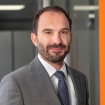PwC's 28th Annual Global CEO Survey - Greece
Reinvention on the Edge of Tomorrow
Discover how Greek leaders are navigating challenges and opportunities in a rapidly shifting market environment.

Overall this year, Greek CEOs continue to be optimistic about their business prospects, all the while realizing the drive for business model reinvention. To succeed in this endeavor, they will need to focus on workforce skills development to converge with their European peers. Going forward, investing in people, in commercial innovation and AI integration should be core strategy for Greek businesses, so that they can best capitalize on the momentum of the Greek economy.
The PwC 28th Global CEO Survey highlights a striking optimism among Greek executives about their domestic market prospects, with 85% expressing positive expectations — surpassing both their European peers and international averages. This confidence is also reflected in Eurostat’s economic sentiment indicator, which ranks Greece at least 10 p.p. above the Eurozone average in 2024, even amid challenges like macroeconomic and geopolitical uncertainties, skills shortages, climate change and cybersecurity threats.
Growth Outlook and Threats
Lack of skilled workforce, geopolitics and climate change emerge as key threats that Greek CEOs assume significantly higher exposure than the global average
How exposed do you believe your company will be to the following key threats in the next 12 months? (showing only “extremely/highly exposed” and “moderately exposed")


Industry boundaries are blurring; companies across sectors have expanded their growth strategy in new sectors, mainly technology and business services Continual reinvention
2 in 3 Greek executives say their company will remain viable for less than ten years, if it continues to run on its current path. They now recognize the need for business model reinvention at a rate notably higher than the global average and their own view in the previous years.
If your company continues running on its current path, for how long do you think your business will be economically viable?
Greek CEO demonstrate reticence to resource reallocation; around 60% move less than 10% of both financial and human resources among BUs.
Analysis of our Global results indicates that higher levels of human resource reallocation are associated with higher profit margins.
What proportion of your company’s human and financial resources did you and your management team reallocate across your business units (BUs) in the past year?
All the while, they continue investing in human resources, with 1 in 2 Greek CEOs expecting to increase headcount in the next year.
To what extent will your company increase or decrease headcount in the next 12 months?
Climate-friendly investments
Eagerness to accept lower than minimum returns for climate-friendly investments has globally eroded by 16pp and further in Greece by 25pp. For Greece, this is in part due to significantly lower historical increase in revenue and state incentives than its regional peers and other regions.
On top of that, Greek CEOs face regulatory complexity and lack of external demand at higher rate than both their European and global peers.
GenAI adoption
Global CEO predictions about the impacts of GenAI turned out to be slightly optimistic across the board, with the exception of headcount. However, looking ahead to 2025, CEOs optimism for AI improving their profitability remains high, and in Greece it is markedly higher than last year. Greek CEOs prioritize tech platforms and workflows as key areas for AI – higher than global, yet only 1 in 4 predicts mid-term integration in workforce and skills. Trust remains the key hurdle for AI adoption, especially for Greece as only 24% of CEOs report comfort to embed it into their company’s processes.
Download the results for Greece
Read PwC's 28th Global CEO Survey
Contact us














